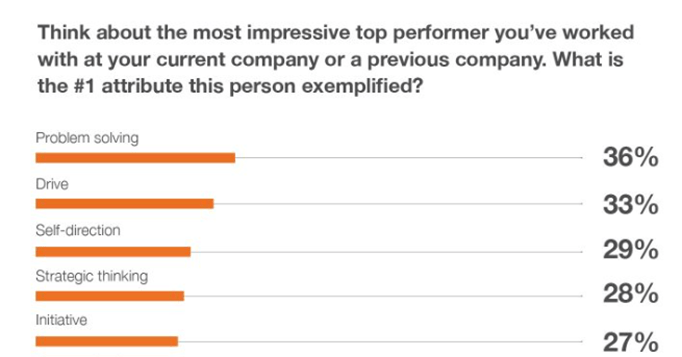
What separates the average employee from a high performer? Most of us know them when we see them. These are people who work efficiently, have positive energy, and are always motivated. They are willing to learn from their mistakes and can be counted on.
Being a high-performer employee is all that and then some. Companies seek top performers for the value they bring and the potential to drive business success and growth. Once they find them, they do everything they can to retain them.
In the article on 5 Key Factors for Becoming a High-Performing Employee, executive coach, speak and Forbes contributor Tony Gambill explains why:
There’s a common misconception that high performers are naturally better. We think they have better skills and more talent. What if we told you the habits of higher performers are learnable and improvable?
In this article, we tell you:
- What a high performer is
- What makes one a high performer
- The traits of a high performer
- Tips to become a high performer
- Frequently asked questions about high performers
What Is a High Performer?
A high performer is a high achiever. These are people or employees who consistently work hard, seek – and drive – excellence, and are never satisfied with their status quo. They always go above and beyond to achieve superior results.
A high performer is always seen as the “go-to” person by leaders, managers, and peers whenever they need a trusted insight or an extra hand at work or in life. They come across as talented, skilled, passionate, team players, and are constantly seeking out new challenges and ways to improve their skill set.
What Makes One a High Performer?
To quote the famous actor and former wrestler Dwayne “The Rock” Johnson:
“I’ll never, ever be full. I’ll always be hungry. Obviously, I’m not talking about food. Growing up, I had nothing for such a long time. Someone told me a long time ago, and I’ve never forgotten it, ’Once you’ve ever been hungry, really, really hungry, then you’ll never, ever be full.”
Dwayne is hands down one of the most famous high performers of our time, and he attributes his success to consistent hard work, focus, effort, and drive.
So, what are some of the signs you’re a high performer at work?
An Indeed survey asked employers to list the top attributes exhibited by the best performers. The top five were:
- Problem-solving. A high performer is great at problem-solving. They embrace challenges and are willing to seek solutions to problems.
- Drive. High performers are driven by a strong desire to achieve their goals and succeed in everything they do. They are always looking for ways to improve their performance and never back off when something gets difficult.
- Self-direction. A top performer is a self-starter. They are open to learning new skills and improving their skills and are not afraid to ask for help when they need it.
- Strategic thinking. High performers are strategic thinkers. They excel at problem-solving, initiating new projects, figuring out solutions to problems, and identifying threats and opportunities.
- Initiative. High-performing employees don’t wait for an opportunity to knock. They actively seek more responsibilities and opportunities. They are not afraid to get their hands dirty and easily adapt to a changing environment.

Source: Indeed
Why Does it Matter to Be a High Performer?
According to a 2012 study by Indiana University, 10 percent of productivity comes from the top one percent of employees and 26 percent of the output from the top five percent. That is, high-performing employees are 4X as much productive as the average employee.
So, as you can see, most companies will obviously prioritize top performers. If one employee can contribute a disproportionate amount of output to a company, they become an invaluable asset. These people are the first to be considered for promotions, rewards, and pay rise.
High performers will have a significant effect on an organization’s overall performance and productivity and can help establish an excellent reputation.
Eight Qualities of High Performers
Top performers have mastered these eight traits to reach and sustain long-term success:
1. Efficient in completing tasks
High performers give maximum effort in their work. They work with dedication and are known for showing consistent efforts to complete their tasks. They develop well-laid-out strategies and work routines, exhibit positive workplace habits, and are always trying to find more efficient ways to do their work.
In addition, they extend their successful strategies to team members or people around them so they can learn to work smarter rather than harder.
2. Have a strong sense of purpose and direction
High performers know what they want and have clear goals to get them where they want. This strong sense of direction not only gives them clarity about what they want to achieve, they plan action steps toward achieving those goals.
This trait enables them to realize greater success, not only at work but in other areas of their lives.
3. Are natural role models
High performers are the “go-to” people in the organization. They aren’t afraid to make executive decisions but also consider the outcomes and impacts of their decision-making. They seek input from leaders and team members and are more likely to support others.
High performers don’t demand respect, they earn it. They are charismatic, inspirational, and empower others. Being a high performer isn’t just about putting in more effort – it’s how you treat the people you work with.
4. Maintains a positive attitude
High-performing employees exude a positive attitude. They quickly recover and learn from their mistakes. To them, failures and challenges are learning experiences rather than setbacks.
High performers maintain high levels of positivity, and this can have major impacts on company culture. Some of the behaviors of positive employees include:
- Greeting coworkers with a smile
- Using words of encouragement
- Encouraging coworkers to focus on positivity
- Willing to step in and help struggling team members
5. Has a growth mindset
High performers believe they can improve their skills through practice, effort, and hard work. They are constantly trying to learn new things and find ways to get better. The growth mindset enables them to come out on top in everything they do.
They have the drive, ambition, and passion to perform better than they did yesterday. Top performers display dedication toward growth and development by:
- Reading books and articles related to their career
- Looking for mentors
- Seeking feedback from managers and coworkers
- Finding online skill-building workshops and seminars
- Getting certifications in career-related fields
6. Willingness to fail and try again
One attribute that separates high performers from average performers is their willingness to fail and try again. They don’t allow the fear of failure to disrupt their mission and objectives. They aren’t afraid to push boundaries or take more risks.
It’s their consistent efforts that lead them to produce better results and become more successful in their careers and lives. It’s why managers and leaders can count on them to complete tasks and achieve their goals.
7. Accepts constructive criticism
Average performers may take critique personally. On the contrary, high performers understand that constructive criticism is meant to help them improve and bring out the best in them.
They use the feedback to learn, grow, and become better at their work. They take the feedback seriously and implement it in their day-to-day activities. When receiving feedback, they ask questions and take proactive steps to act on the suggested improvements.
In fact, high performers don’t wait for feedback. They ask their leaders and managers what they can do to improve their performance.
8. They take regular breaks and maintain a healthy work-life balance
According to a Tork survey, “North American workers who take lunch breaks every day score higher on a wide range of engagement metrics, including job satisfaction, efficiency, and the likelihood to recommend their employer to others.”
High performers understand the benefits of taking breaks for their well-being, energy, and performance.
Lack of regular breaks in your workday will result in exhaustion and burnout, leading to low productivity.
There are several time management techniques that you can implement to ensure you take regular breaks throughout the workday:
- Pomodoro Technique: This method entails breaking down your workday into 25-minute sessions followed by 5-minute breaks after each interval. After four Pomodoros, you can increase the duration of your breaks from five to 15-30 minutes.
- Time blocking: With this method, you prioritize tasks and then set a fixed amount of time to accomplish a specific task before moving to the next. You then take a break after each time block to prevent fatigue and burnout.
- The 52/17 rule: This time management method recommends focusing on work for 52 minutes followed by a 17-minute break to rest and recharge.
Apart from breaks, high performers also know that a healthy work-life balance contributes to high levels of motivation, creativity, and productivity. They balance priorities in their professional and personal lives and ensure that they establish routines that support their efforts to care for their well-being.
Tips to Become a High Performer at Work
Good things happen to the best performers at work. You, too, can learn how to become a high performer by implementing these useful tips:
Set personal and professional goals
Your road to becoming a high performer starts with setting performance goals in your career and personal life. Start by assessing your personal and professional expectations and then set goals that align with these expectations.
To make your goals more effective, review your current performance to identify what you need to change or improve.
Now, focus on two to three areas to improve on at a time and create SMART goals to help you achieve your target.
For example, if you have poor time management skills, start by learning effective ways to manage time. Find a reliable time-tracking tool like Traqq to monitor your time usage when working. This tool collects data about how you spend time, and you can generate reports for analysis. Once you identify where your time goes, you can devise ways to manage your time better.
Learn to be a self-starter and an excellent team player
High performers don’t need hand-holding to do their work. They demonstrate innovation, creativity, and initiative. Therefore, to become a top performer, don’t wait around for things to happen. Make them happen.
Find out if your manager has extra work when your workload eases up. Ask if team members need help completing a specific project.
Keep on learning
The world is moving fast, and staying up to date with trends in your field gives you a competitive edge. It also shows potential for becoming a high performer.
High performers are always looking for opportunities for long-term growth, professionally and personally.
Find courses that will improve your skills and request tasks that will teach you something new. Listen to leaders that inspire you on Ted Talk or YouTube, or watch documentaries that will expand your expertise in a certain field or help you be a better version of yourself.
Be respectful
Being a top performer doesn’t make you superior. When you treat others like they are inferior to you, no one will want to work with you. Learn to treat everyone, regardless of their career level, title, or position, with respect.
Be humble. Be polite. Be courteous.
Accept everyone for who they are and try to help others when in need.
Only take advice from the right people
You don’t need to take advice from every Tom, Dick, and Harry. Choose carefully who to listen to. But how do you know who the right people are? As Amy Morin expresses on Forbes, there are three kinds of people you should actually take advice from are:
- People who truly care about you. These people see your work from a different angle and provide suggestions that might be instrumental in helping you grow and succeed.
- People with proven expertise. Spectators are quick to give opinions about you and your work. Don’t listen to them. Only seek the strategies of successful people with expertise in their field. After all, they are speaking from experience.
- People who use your services. The people you serve, like your customers or clients, are in a unique position to criticize your work. They get products or services from you and know areas of user experience that need improving. When a customer complains that your products or services are worth the price, they are probably right. Not that you’ll need to make changes every time a customer or client complains, but it means you should listen to their feedback and implement what’s possible.
Learn from failure
The most successful people on the planet didn’t get there overnight. They encountered failure after failure but didn’t give up. They understood that failures are life lessons. So, they learned from them and bounced back better.
Michael Jordan, an American businessman, and former professional basketball player put it best:
“I know fear is an obstacle for some people, but it is an illusion to me. Failure always made me try harder next time.”
Set aside distraction-free time for deep-focus work
We are surrounded by endless distractions at work every day, whether we work from home or the office.
These distractions prevent us from achieving optimal work within the limited time of a workday.
To be a high performer, learn to eliminate distractions from your workday. Create a schedule and time block at least three hours to do intense work. Doing so will enable you to work more efficiently and produce high quality work.
Some of the ways to limit distractions include:
- Putting your phone on mute or activating Airplane mode
- Charging your phone in a different room
- Limiting meetings to 30 minutes
- Scheduling time to check emails, make phone calls, and take breaks
Key Takeaways
A high performer is someone who naturally stands out from the crowd for loving what they do, doing it well, and consistently generating great results. They are ready to take on more responsibilities and have a growth mindset.
They are self-motivated, self-starters, and portray leadership skills. They don’t fear failure, but rather know it’s a step in their journey to success. To become a high performer, you must be willing to embrace these qualities of a high performer.
Frequently Asked Questions About High Performers
What Do High Performers Do Differently?
High performers identify their strengths and weaknesses and play to their strengths. Rather than focusing on their weaknesses, they center their development and growth around their strengths.
A 2015 Gallup survey suggests that people who play to their strengths every day are 3X more likely to report having an excellent quality of life. At their jobs, they are six times more likely to be engaged, eight percent more productive, and 15 percent less likely to quit.
High performers also:
- Relentlessly track their performance and focus on getting better.
- Have drive, direction, and purpose
- Set goals and think ahead
- Value their health and time
- Are self-motivated and ask the right questions
- Are active listeners
What Are the Main Habits of High Performers?
Some of the main habits of every high performer include:
- Managing their time well
- Maintaining positivity
- Showing consistent effort
- Open to feedback
- Respecting everyone
- Seek opportunities to learn and grow
- Never run away from challenges
How to Avoid a High Performer Burnout?
High performers maintain a healthy work-life balance to prevent burnout. They draw a fine line between their professional and personal lives. They work hard throughout the week but ensure to take regular breaks.
High performers establish healthy habits to prevent them from burnout, such as:
- Exercising
- Tracking their time
- Listening to music while working
- Spending time with friends and family during the weekends
- Doing what they love in their free time
What Is the Difference Between a High Performer and Someone with High Potential?
High performers are passionate about their work and continue to excel in their roles or department. They know what they want to achieve and approach challenges with confidence.
Someone with high potential hasn’t reached the point of their best performance, yet, but is on the right path. Either they aren’t pushing themselves hard enough or lack the support and resources to get there.
With the right support and guidance, they can reach their full potential and become high performers.


